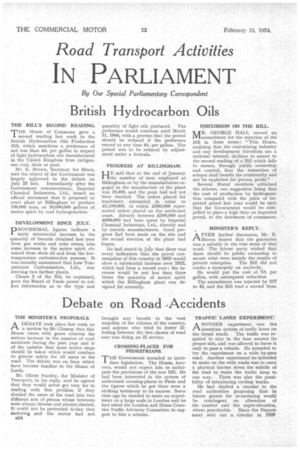Road Transport Activities
Page 34

If you've noticed an error in this article please click here to report it so we can fix it.
IN PARLIAMENT
By Our Special Parliamentary Correspondent
British Hydrocarbon Oils
THE BILL'S SECOND READING.
THE House of Commons gave a second reading last week to the British Hydrocarbon Oils Production Bill, which sanctions a preference of not less than 4d. per gallon in respect of light hydrocarbon oils manufactured in the United Kingdom from indigenous coal, shale or peat.
Mr. E. Brown, Secretary for Mines, said the object of the Government was largely approved in the debate on July 25 last. Immediately after the Government announcement, Imperial Chemical Industries, Ltd., issued an official statement that it proposed to erect plant at Billingharn to produce 100,000 tons, or 30,000,000 gallons of motor spirit by coal hydrogenation.
DEVELOPMENT SINCE JULY.
PROVISIONAL figures indicate a fairly substantial increase in the quantity of benzole obtained last year front gas works and coke ovens, also some increase in the motor spirit obtained from shale oil and from the lowtemperature carbonization process. It was recently announced that Low Temperature Carbonisation, Ltd., was erecting two further plants.
Clause 2 of the Bill, he explained, gave the Board of Trade power to collect information as to the type and quantity of light offs produced. The preference would continue until March 31, 1944, with a proviso that the period should be reduced if the preference exceed at any time 4d. per gallon. The period was to be reduced by adjustment under a formula.
PROGRESS AT BILLINGHAM.
HE said that at the end of January the number of men employed at Billingham, or by the manufacturers engaged in the manufacture of the plant was 10,400, and the peak had not yet been reached. The orders placed for machinery amounted in value to
1,100,000, of which £360,000 represented orders placed on the north-east coast. Already between £500,000 and £.600,000 had been spent by Imperial Chemical Industries, Ltd., directly and by outside manufacturers. Good pro_ gress had been made on the site and the actual erection of the plant had begun.
He had stated in July that there was every indication that the petrol consumption of this country in 1933 would show a substantial increase over 1932, which had been a record year ; the increase would be not less than three times the quantity of motor spirit which the Billingham plant was designed for annually. DISCUSSION ON THE BILL.
MR. GEORGE HALL moved an amendment for the rejection of the Bill in these terms : "This House, realizing that the coal-mining industry and any development therefrom are a national interest, declines to assent to the second reading of a Bill which fails to ensure, through public ownership and control, that the researches .of science shall benefit the community and not be exploited for privat, profit."
Several liberal members criticized the scheme, one suggestion being that the cost of production by hydrogenation compared with the price of imported petrol last year would be such that the Government would be compelled to place a high duty on imported petrol, to the detriment of consumers.
MINISTER'S REPLY.
AFTER further discussion, Mr. E. Brown denied that the guarantee was a subsidy in the true sense of that word. The labour party wished that there should be public ownership to secure what were mainly the results of private enterprise. The Bill did not• confer a monopoly on anybody.
He would put the cost at 7d. per gallon, with subsequent reduction.
The amendment was rejected by 217 to 43, and the Bill read a second time.




















































































